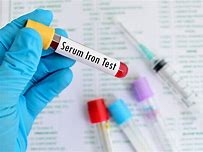Complete Blood Count (CBC): While not specific to iron, CBC includes parameters like hemoglobin, hematocrit, mean corpuscular volume (MCV), and mean corpuscular hemoglobin concentration (MCHC). Abnormalities in these values can indicate anemia, which may prompt further investigation into iron status.
Ferritin: Measures the amount of ferritin, a protein that stores iron, in the blood. It reflects the body's iron stores and is often used to diagnose iron deficiency anemia or iron overload conditions.
Total Iron-Binding Capacity (TIBC): Measures the capacity of proteins in the blood to bind with iron. It indirectly assesses transferrin levels, which transport iron throughout the body.
Transferrin: transferrin acts as a carrier protein that binds and transports iron throughout the body.
Transferrin Saturation: Calculated as a percentage using serum iron and TIBC measurements. It indicates how much of the transferrin protein is saturated with iron. Low levels may indicate iron deficiency, while hig


